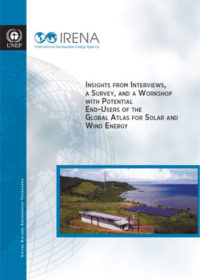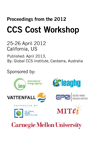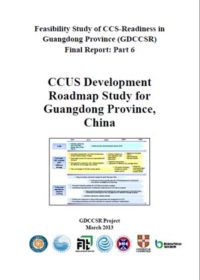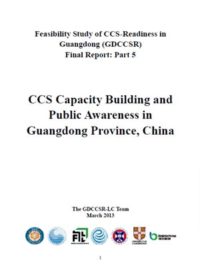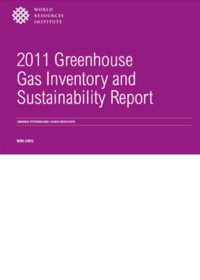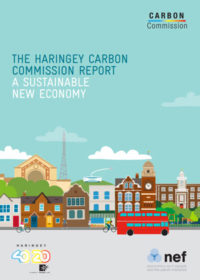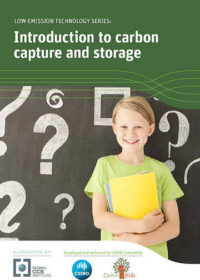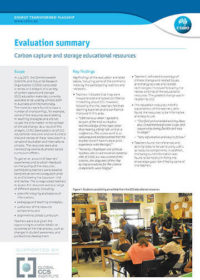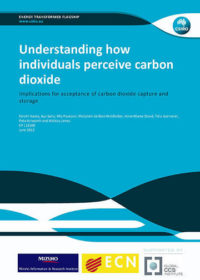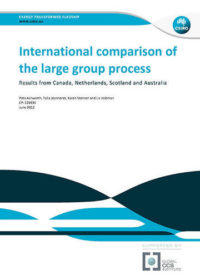Resources
Publications
Our publications, reports and research library hosts over 500 specialist reports and research papers on all topics associated with CCS.
View our Publication Library Disclaimer.
Filter by
Insights from interviews, a survey and a workshop with potential end-users of the global atlas for solar and wind energy
1st June 2013
Topic(s): Public engagement, Renewables, Solar energy, Wind energy
The Global Renewable Energy Atlas is an open-access on-line resource intended to support well-informed energy policy and investment decisions. The International Renewable Energy Agency (IRENA) and the United Nations Environment Programme (UNEP) have compiled feedback from end-users during this first phase to provide guidance for subsequent Global Atlas expansion. This joint report compiles responses and makes recommendations from extensive end-user consultations.
Disclaimer
The content within the Global CCS Institute Publications, Reports and Research Library is provided for information purposes only. We make every effort and take reasonable care to keep the content of this section up-to-date and error-free. However, we make no claim as to its accuracy, currency or reliability.
Content and material featured within this section of our website includes reports and research published by third parties. The content and material may include opinions and recommendations of third parties that do not reflect those held by the Global CCS Institute.
Proceedings from the 2012 CCS cost workshop: 25-26 April 2012, California, US
1st April 2013
Topic(s): Carbon capture use and storage (CCUS), Economics, Public engagement
The third meeting of the Expert Group on CCS costs was held on April 25-26 2013 and hosted by the Electric Power Research Institute in Palo Alto. The current understanding of the costs of CCS was presented at that meeting and the agreed outcomes for the Group to take forward are included in this document.
This work program consists of efforts to improve both the transparency of CCS cost calculations and the broader challenges associated with conveying messages around costs to the broader community.
The meeting focused on a number of issues including considering guidelines and recommendations developed by a Task Group for a costing method and nomenclature that could be broadly adopted to produce more consistent and transparent cost estimates for CCS applied to electric power plants; along with how to evaluate emerging process as well as transport, storage and utilization.
Topics discussed over the two days included:
- What are the main reasons for the reported costs of CCS demonstrations being significantly higher than the numbers in published CCS cost studies?
- What information would be useful to have from demonstration projects to help improve the published cost estimates?
- Should transport and storage form part of the work program to harmonize cost methods and nomenclature? And if so, what cost elements can be harmonized?
- How should ‘enhanced oil recovery’ storage operations be incorporated in harmonization efforts for storage? Alternatively, do the cost categories vary compared to saline formations?
- What types of methodologies are used to estimate costs for emerging processes?
- What kind of information should be reported in order to understand ‘what lies behind’ economic evaluations of emerging processes?
- How is the mix of commercially proven and modifications to commercially proven technologies best handled in terms of estimating equipment costs?
- How can uncertainties and risks be assessed in relation to estimated costs?
Disclaimer
The content within the Global CCS Institute Publications, Reports and Research Library is provided for information purposes only. We make every effort and take reasonable care to keep the content of this section up-to-date and error-free. However, we make no claim as to its accuracy, currency or reliability.
Content and material featured within this section of our website includes reports and research published by third parties. The content and material may include opinions and recommendations of third parties that do not reflect those held by the Global CCS Institute.
CCUS development roadmap study for Guangdong Province, China
1st March 2013
Topic(s): Capacity development, Carbon capture use and storage (CCUS), Policy law and regulation, Project financing, Public engagement
The Chinese Government emphasises the need to utilise captured CO2 as a resource and promotes CCUS. Because the utilisation of CO2 can partly offset the cost of CCUS, it is considered a priority for developing CCUS, and it is particularly important for developing countries.
In order to study the prospect and roadmap of developing CCUS in Guangdong Province, the project “Feasibility Study of Developing CCS-Readiness in Guangdong Province” (GDCCSR)was conducted from April 2010 to March 2013. The project was implemented by seven institutions in China and UK (the South China Sea Institute of Oceanology of Chinese Academy of Sciences (CAS), the Energy Research Institute of the National Development and Reform Commission, the Guangzhou Institute of Energy Conversion of CAS, the Wuhan Institute of Rock and Soil Mechanics of CAS, Shenzhen Linkschina Ltd., the University of Edinburgh, and the University of Cambridge) and funded by the UK Government Foreign & Commonwealth Office and Global Carbon Capture and Storage Institute (GCCSI). This report is the key deliverable of the GDCCSR project.
Disclaimer
The content within the Global CCS Institute Publications, Reports and Research Library is provided for information purposes only. We make every effort and take reasonable care to keep the content of this section up-to-date and error-free. However, we make no claim as to its accuracy, currency or reliability.
Content and material featured within this section of our website includes reports and research published by third parties. The content and material may include opinions and recommendations of third parties that do not reflect those held by the Global CCS Institute.
CCS capacity building and public awareness in Guangdong Province, China
1st March 2013
Topic(s): Capacity development, Carbon capture use and storage (CCUS), Public engagement
Based on the outcomes of our study, the GDCCSR project has shown the necessity, and provided feasible solutions, for the development of CCS and CCSR in Guangdong, and drafted a roadmap that includes action plans and policy recommendations. We would like to share our experience in promoting regional CCS developments, enhancing knowledge exchange, and building up local expertise. In order to implement CCS in Guangdong and other parts of China in the future, we consider that extra work is required to disseminate the findings of this project more widely.
The capacity building activities, based on experiences from other researchers, were usually focussed on: workshops; personnel exchange programs; technical assistance for planned pilot CCS activities; information exchange; facilitation of technology transfer; training programs; study tours on regulations and standards; summer school programs; information and knowledge sharing programs; support for feasibility studies; and providing opportunities for engineers to work on CCS demonstration projects. The GDCCSR project team has been working on various activities in Guangdong, such as CCS meetings & workshops, information and knowledge sharing websites & blogs, information exchange with experts from industrial companies, visiting power plants etc. In the future, we are aiming to take further action and employ other methods to continue capacity building activities.
Disclaimer
The content within the Global CCS Institute Publications, Reports and Research Library is provided for information purposes only. We make every effort and take reasonable care to keep the content of this section up-to-date and error-free. However, we make no claim as to its accuracy, currency or reliability.
Content and material featured within this section of our website includes reports and research published by third parties. The content and material may include opinions and recommendations of third parties that do not reflect those held by the Global CCS Institute.
Communications for carbon capture and storage: identifying the benefits, managing risk and maintaining the trust of stakeholders
28th February 2013
Topic(s): Carbon capture use and storage (CCUS), Public engagement
Disclaimer
The content within the Global CCS Institute Publications, Reports and Research Library is provided for information purposes only. We make every effort and take reasonable care to keep the content of this section up-to-date and error-free. However, we make no claim as to its accuracy, currency or reliability.
Content and material featured within this section of our website includes reports and research published by third parties. The content and material may include opinions and recommendations of third parties that do not reflect those held by the Global CCS Institute.
Thematic report: Public engagement session October 2012
15th February 2013
Topic(s): Carbon capture use and storage (CCUS), Public engagement
This report presents the discussions and conclusions reached at a workshop of the European CCS Demonstration Project Network in September 2012 – examining the messaging, tools used and the language used to communicate about CCS. This report seeks to complement and follow on from the report from May 2012 by the same group, which examined the perceived risks and stakeholder profiles that these messages, and messengers, serve and address.
Disclaimer
The content within the Global CCS Institute Publications, Reports and Research Library is provided for information purposes only. We make every effort and take reasonable care to keep the content of this section up-to-date and error-free. However, we make no claim as to its accuracy, currency or reliability.
Content and material featured within this section of our website includes reports and research published by third parties. The content and material may include opinions and recommendations of third parties that do not reflect those held by the Global CCS Institute.
2011 greenhouse gas inventory and sustainability report
1st January 2013
Topic(s): Public engagement
This report provides a comprehensive description of World Resources Institute’s 2011 greenhouse gas emissions inventory. It compares the 2010 and 2011 inventories, notes changes to base year emissions, and describes other sustainability activities. The report covers the period from October 1, 2010 to September 30, 2011.
Disclaimer
The content within the Global CCS Institute Publications, Reports and Research Library is provided for information purposes only. We make every effort and take reasonable care to keep the content of this section up-to-date and error-free. However, we make no claim as to its accuracy, currency or reliability.
Content and material featured within this section of our website includes reports and research published by third parties. The content and material may include opinions and recommendations of third parties that do not reflect those held by the Global CCS Institute.
The Haringey Carbon Commission report: a sustainable new economy
1st October 2012
Topic(s): Economics, Energy efficiency, Project financing, Public engagement
This New Economics Foundation report identifies how Haringey - a London borough - can innovate to tackle the climate change challenge. The report describes how local government can work to make homes more energy efficient, makes a case for alternative energy supply, and sets out a vision for strengthened community organisations.
Disclaimer
The content within the Global CCS Institute Publications, Reports and Research Library is provided for information purposes only. We make every effort and take reasonable care to keep the content of this section up-to-date and error-free. However, we make no claim as to its accuracy, currency or reliability.
Content and material featured within this section of our website includes reports and research published by third parties. The content and material may include opinions and recommendations of third parties that do not reflect those held by the Global CCS Institute.
Low-emission technology series: introduction to carbon capture and storage
13th August 2012
Topic(s): Carbon capture use and storage (CCUS), Education, Public engagement
This document is designed to introduce teachers and students to carbon capture and storage (CCS), one of a number of low-emission energy technologies. These materials are part of CSIRO’s CarbonKids, a program now in over 230 schools around Australia that helps school communities understand one of the most challenging issues facing the world today – climate change – and the issues around it, including energy technologies, adaption and mitigation. CarbonKids combines the latest science with inquiry-based education.
Disclaimer
The content within the Global CCS Institute Publications, Reports and Research Library is provided for information purposes only. We make every effort and take reasonable care to keep the content of this section up-to-date and error-free. However, we make no claim as to its accuracy, currency or reliability.
Content and material featured within this section of our website includes reports and research published by third parties. The content and material may include opinions and recommendations of third parties that do not reflect those held by the Global CCS Institute.
Evaluation summary: carbon capture and storage educational resources
13th August 2012
Topic(s): Carbon capture use and storage (CCUS), Education, Public engagement
In July 2011, the Commonwealth Scientific and Industrial Research Organisation (CSIRO) conducted a review and analysis of a variety of carbon capture and storage (CCS) education materials currently available to be used by schools both in Australia and internationally. The materials were found to have a number of shortcomings, for example, some of the resources were lacking in teaching strategies and did not situate the information in the context of climate change. As a result of this analysis, CSIRO developed a set of CCS educational resources and conducted a trial and review of these resources in a sample of Australian and international schools. The resources were also reviewed by several Australian-based curriculum officers.
Disclaimer
The content within the Global CCS Institute Publications, Reports and Research Library is provided for information purposes only. We make every effort and take reasonable care to keep the content of this section up-to-date and error-free. However, we make no claim as to its accuracy, currency or reliability.
Content and material featured within this section of our website includes reports and research published by third parties. The content and material may include opinions and recommendations of third parties that do not reflect those held by the Global CCS Institute.
Understanding how individuals perceive carbon dioxide: implications for acceptance of carbon dioxide capture and storage
1st June 2012
Topic(s): Carbon capture use and storage (CCUS), Public engagement
Almost all explanations of CCS technology make reference to carbon dioxide (CO2), with an assumption that the general public understands CO2. It has become apparent that the general public’s knowledge and understanding of CO2’s properties influences how they engage with CO2-emitting industries and CCS technologies. However, surprisingly little research has investigated public perceptions, knowledge, and understanding of CO2. This investigation attempts to fill that gap.
This report describes an investigation of how citizens of three countries — Japan, Australia, and the Netherlands — perceive CO2. Furthermore, it attempts to relate individual perceptions of CO2 to perceptions of CCS, and to determine how information provision about the underlying properties and characteristics of CO2 influences individual attitudes towards low-carbon energy options, particularly CCS.
Disclaimer
The content within the Global CCS Institute Publications, Reports and Research Library is provided for information purposes only. We make every effort and take reasonable care to keep the content of this section up-to-date and error-free. However, we make no claim as to its accuracy, currency or reliability.
Content and material featured within this section of our website includes reports and research published by third parties. The content and material may include opinions and recommendations of third parties that do not reflect those held by the Global CCS Institute.
International comparison of the large group process: results from Canada, Netherlands, Scotland and Australia
1st June 2012
Topic(s): Carbon capture use and storage (CCUS), Public engagement
The research presented in this report presents the results of a large group workshop process, developed in Australia that was replicated across four different countries to engage a cross section of the community. The countries selected were chosen on the basis that carbon capture and storage (CCS), a technology to prevent large amounts of carbon dioxide (CO2) being released into the atmosphere from the use of fossil fuel in power generation and other industries is being seriously considered as a mitigation option by governments in those countries and included the Netherlands, Scotland, Canada and Australia.
The main aims of the research were to:
- explore the views of individuals on climate change and the range of energy technologies;
- provide background information on climate change and energy technologies; and
- enable the opportunity for discussion with peers.
The study assesses the impact of the information and the process on individual knowledge, attitudes and behaviours, and analyses individual views on the potential solutions for mitigation, including CCS, and how these views change as a result of the workshop.
In total 374 participants attended the workshops. The workshop in the Netherlands was attended by the highest number of participants (n=111), followed by Scotland (n=99), Canada (n=80) and Australia (n=841).
The results indicated that the workshop was successful in increasing participants' self-rated knowledge about CCS and the portfolio of energy technologies. As in previous research, there was strong support for renewable energy and concerns expressed over any investment in CCS at the expense of renewable energy development. It was also apparent that country context does impact on energy technology preferences. The samples in Australia and Canada – which export a large component of their fossil fuels – were more positive about the role of CCS compared to those in the Netherlands and Scotland.
The results suggest that the process was successful in gaining citizens' participation and investment in sharing information about energy issues, particularly evidenced by the increase in group identification over the course of the workshop. This seems to indicate, that little was lost by engaging up to 100 people in the room, rather than the normal dozen that would likely participate in a focus group. As such, the process has evident potential to be used to engage larger numbers within a local community about CCS, as it provides a way to access participants’ opinions and allow them to feel that they have been heard. This is in contrast to the more traditional town hall style meeting, where only the loudest voices tend to be acknowledged and can have the greatest influence on the outcome.
Disclaimer
The content within the Global CCS Institute Publications, Reports and Research Library is provided for information purposes only. We make every effort and take reasonable care to keep the content of this section up-to-date and error-free. However, we make no claim as to its accuracy, currency or reliability.
Content and material featured within this section of our website includes reports and research published by third parties. The content and material may include opinions and recommendations of third parties that do not reflect those held by the Global CCS Institute.
